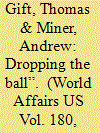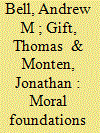| Srl | Item |
| 1 |
ID:
155592


|
|
|
|
|
| Summary/Abstract |
From the Roman Colosseum to the Yankee Stadium, the Olympics to the Super Bowl, sports have always played a central role in societies. With so much at stake—money, pride, power (and occasionally even fun)—sports are undeniably political. Yet despite this recognition, political scientists and policy scholars devote little attention to the study of sports, especially compared with other disciplines like business, law, and economics. We offer reasons for this void and suggest how political scientists can begin to fill it. In our view, the nexus between sports and politics is not only a vital topic of study on its own, but it can also provide a lens through which to examine—and test—broader questions in the discipline. We propose how scholars can think more systematically about the interaction of politics and sports and leverage the distinctive qualities of sports to improve causal identification across a range of issue areas and subfields in political science and policy studies.
|
|
|
|
|
|
|
|
|
|
|
|
|
|
|
|
| 2 |
ID:
187554


|
|
|
|
|
| Summary/Abstract |
How does partisan identification shape the attitudes of US military officers toward the protection of civilians in war? Drawing on unique cross-cohort surveys of soon-to-be commissioned officers in 12 Army Reserve Officers’ Training Corps (ROTC) training battalions, we find that Democratic-leaning cadets generally prioritize norms of civilian protection more than Republican-leaning cadets when confronted with competing values of military advantage and force protection as part of a ‘combatant’s trilemma’. This gap remains partially resilient after sustained exposure to military training and socialization, including in the norms of restraint embodied by principles of combat ethics and the law of war. We attribute these partisan differences to insights from Moral Foundations Theory (MFT), which suggests that the moral values of Democrats and Republicans guide their views toward the individual use of force in combat. Our findings have important implications for comprehending the impact of political ideology and military training and socialization on attitudes regarding restraint toward civilians in war. Given the widely recognized conservative composition of the US military’s membership, these findings may help to further inform understanding of US military operations and the underlying causes of US adherence to – or violation of – the laws of armed conflict.
|
|
|
|
|
|
|
|
|
|
|
|
|
|
|
|
| 3 |
ID:
152123


|
|
|
|
|
| Summary/Abstract |
Many theories attempt to explain why some countries democratize and others do not. Existing accounts, however, focus almost exclusively on structural factors and ignore individual leaders. In this article, we argue that leaders educated at Western universities are more likely to democratize than other leaders because Western education socializes leaders to prefer democracy and creates transnational linkages that alter the strategic calculus of democratization. Utilizing an original data set on the specific colleges and universities world leaders attended, we show that Western-educated leaders significantly and substantively improve a country’s democratization prospects.
|
|
|
|
|
|
|
|
|
|
|
|
|
|
|
|